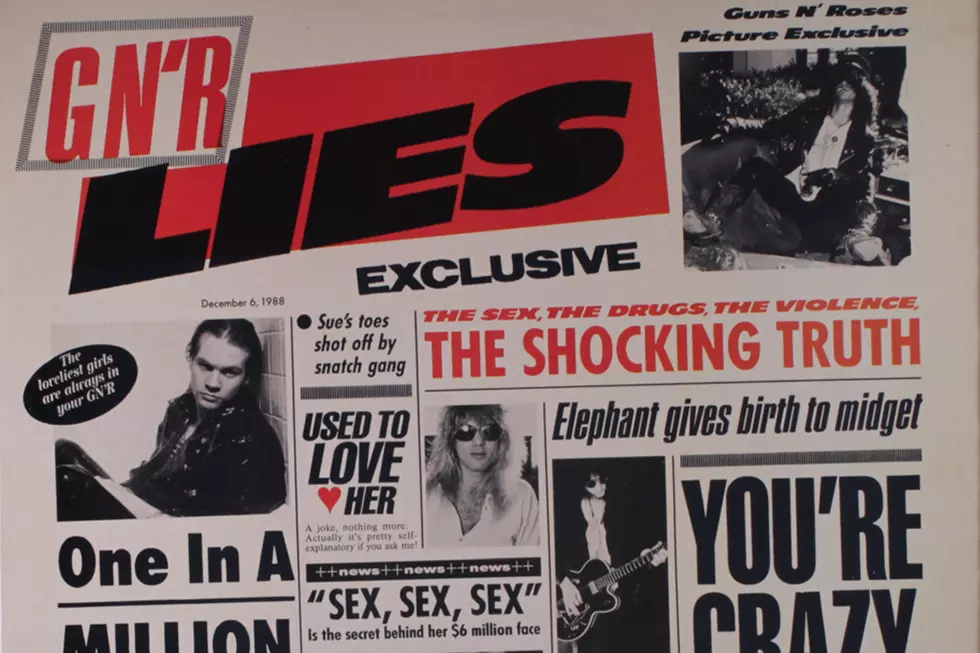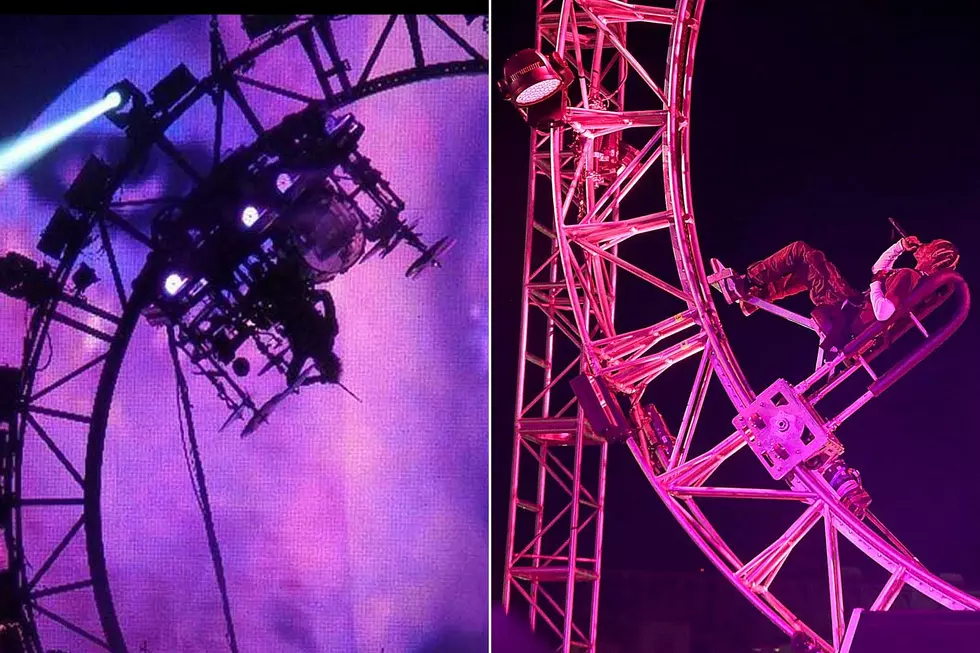
Guns N’ Roses ‘GN’R Lies': A Track-by-Track Guide
In November 1988, Guns N’ Roses followed up their all-conquering debut album Appetite for Destruction with what, on the face of it, might have looked like a lazy attempt to cash in on the buzz.
GN’R Lies featured just eight tracks, the first four of which were previously available on the 1986 Live ?!*@ Like a Suicide EP – and three of those were cover versions.
It was on the second side of the record that it became clear there was more to Lies than first impressions suggested. It showcased three new Guns N' Roses compositions and a reworked version of a track from the debut album.
All four of the songs were stripped back and recorded with acoustic guitars. Some of the new material justified the hype, and some invited controversy, notoriety and accusations of racism and homophobia. Whatever your view, there’s no denying Lies had an impact, with almost 10 million copies sold since its release.
We break down the record, track by track.
"Reckless Life"
Kicking off the Live ?!*@ Like a Suicide part of Lies is a cover of a song by the pre-Guns N’ Roses band Hollywood Rose. It's dressed up to sound like a live performance, including audience cheers from a '70s festival, according to Duff McKagan’s autobiography It’s So Easy (And Other Lies). Knowing that the applause is canned is slightly jarring all these years later, but there's plenty in the performance for fans to get excited about.
"Reckless Life" begins with Slash shouting over the fake crowd noise, "Hey, fuckers, suck on Guns N' fuckin' Roses," before the band launches into the first of the four faux live tracks.
It makes sense they'd cover this song, since it sits seamlessly alongside the sound cultivated on Appetite for Destruction and was written by Axl Rose and Izzy Stradlin. Rose's signature vocals cuts through the song's heavy blues roots as a typically ballsy Slash solo lays down a marker. McKagan's bass also makes a striking impression, sitting high in the mix and allowing him the space to shine.
"Nice Boys"
The fake live set continues with another cover version. "Nice Boys" is remarkably similar in tempo and structure to "Reckless Life," signaling the proud roots of Hollywood Rose and, by extension, Guns N' Roses. It was penned by Australian group Rose Tattoo, but "Nice Boys" is almost a wry statement on the Guns N' Roses ethos.
"Move to the City"
It's the only one of the four "live" tracks that isn't a cover, though it was written by Stradlin and two people who were never actually in Guns N' Roses: Hollywood Rose member Chris Weber and longtime GN'R crew member Del James. That oddity aside, "Move to the City" brings a change of pace from the two opening tracks, which almost blend into one. The guitars are beefed up with a lively horn section that gives this song something few other GN'R tracks have. It's not exactly a classic, but there's a certain youthful charm to the song, and it's arguably the standout of the four live cuts.
"Mama Kin"
Aerosmith were a major influence on Guns N' Roses, particularly on Slash, so it's no surprise they chose to cover one of their songs. "Mama Kin" was probably the obvious choice, fitting neatly alongside the early GN'R sound. Packed with attitude, it also gives Rose the platform to ham up his by now increasingly controversial persona.
"Patience"
Here's where things really start to get interesting, with GN'R displaying a softer side and a keen ear for a ballad. "Patience" was the only single released from Lies, peaking at No. 4 on the Billboard Hot 100 in 1989. Opening with bittersweet acoustic guitars, Rose's whistling introduces a slight country feel to the track.
When his lead vocal comes in, Rose sounds as far from his usual nasally wild-man persona as he's ever sounded. It isn't until "Patience" approaches its climax that we hear him as we'd come to know him, and the shift in vocal delivery only adds to the song's power.
Even though he didn't lift his sticks in the recording, drummer Steven Adler provides backing vocals on the song.
"Used to Love Her"
Widely slammed as misogynistic after its release, "Used to Love Her" is somehow only the second most controversial track on Lies. Lyrics about killing a serially complaining girlfriend outraged a lot of people, though the band insisted it was nothing more than a joke. In 2016, the song was in the news again when it came up in a California murder case. A prosecutor claimed a man had been listening to "Used to Love Her" before shooting his partner to death.
There is certainly a jovial feel to the recording. Whether that's proof of the "joke" or a damning indication that they found domestic violence funny is a matter of opinion, but perhaps Rose's throwaway line "Take it for what it is," delivered before the final chorus, offers some clue.
"You're Crazy"
Seeing how it appears among a clutch of covers on a record of just eight songs, an acoustic version of a track that was previously released on Appetite for Destruction could be taken as a shameless cash-in. But that would be ignoring the fact that this is a slick rendition of the track that works brilliantly – arguably even better than the original. Slowing things down from the Appetite version, the Lies take on "You're Crazy" allows Rose to pour the attitude on good and thick, and it loses none of its impact.
"One in a Million"
In an attempt to explain the use of the N-word in this most controversial of songs, Rose said, "It’s a word to describe somebody that is basically a pain in your life, a problem" – as if that would get him a pass.
A later verse takes aim at "immigrants" and uses a homophobic slur that Rose tries to justify by explaining he has had "very bad experiences with homosexuals."
While he was quick to defend the lyrical content of "One in a Million" back in 1989, the fact that the song was axed from a retrospective box set in 2018 is a strong indication he wouldn't offer the same explanations if asked today.
Listening to the song three decades on, it's impossible to offer an objective view on it without those words playing a part. Hearing Rose forcefully proclaim "That's right" immediately after uttering the N-word is difficult to square, and things don't get a whole lot better in terms of language.
"One in a Million" starts promisingly enough, with more of Rose's whistling and a harder edge to the acoustic guitars than the ones on "Patience." Musically, however, it doesn't have half the character of the single. This is one time when controversy didn't serve Guns N' Roses well.
Axl Rose Year by Year: 1984-2017 Photos
More From 92.9 The Lake



![You Can Now Get An Amazon Alexa ‘Big Mouth Billy Bass’ [VIDEO]](http://townsquare.media/site/33/files/2018/11/big-mouth-billy-bass.jpg?w=980&q=75)




![Pastor Delivers Sermon On A Zipline In Church [WATCH]](http://townsquare.media/site/159/files/2018/11/Instagram-video-by-GODsent-%2525E2%252580%2525A2-Nov-25-2018-at-12-34-PM.png?w=980&q=75)

